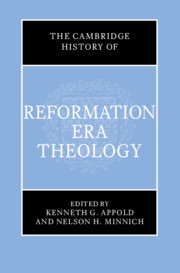Book contents
- The Cambridge History of Reformation-Era Theology
- The Cambridge History of Reformation-Era Theology
- Copyright page
- Contents
- Figures
- Acknowledgments
- Contributors
- Abbreviations
- Introduction
- Part One Theology in an Age of Cultural Transformation
- 1 The Printing Press and its Impact on the Production, Proliferation, and Readership of Theological Literature
- 2 Humanism and Theology
- 3 The Changing Role of the Bible in Theological Discourse
- 4 The Regulation of Theology in the Reformation Era
- 5 Political Change and Theological Discourse
- 6 Universities, Monastic Studia, Academies, Seminaries, and Catechesis
- 7 Para-Academic Theology: Theology of the “Uneducated”
- 8 Gender and Theology in the Reformation Era
- 9 The Theologians and the Clergy: Who Were They?
- Part Two Schools and Emerging Cultures of Theology: Diversity and Conformity within Confessions
- Part Three Topics and Disciplines of Theology
- Index
- References
2 - Humanism and Theology
from Part One - Theology in an Age of Cultural Transformation
Published online by Cambridge University Press: 27 September 2023
- The Cambridge History of Reformation-Era Theology
- The Cambridge History of Reformation-Era Theology
- Copyright page
- Contents
- Figures
- Acknowledgments
- Contributors
- Abbreviations
- Introduction
- Part One Theology in an Age of Cultural Transformation
- 1 The Printing Press and its Impact on the Production, Proliferation, and Readership of Theological Literature
- 2 Humanism and Theology
- 3 The Changing Role of the Bible in Theological Discourse
- 4 The Regulation of Theology in the Reformation Era
- 5 Political Change and Theological Discourse
- 6 Universities, Monastic Studia, Academies, Seminaries, and Catechesis
- 7 Para-Academic Theology: Theology of the “Uneducated”
- 8 Gender and Theology in the Reformation Era
- 9 The Theologians and the Clergy: Who Were They?
- Part Two Schools and Emerging Cultures of Theology: Diversity and Conformity within Confessions
- Part Three Topics and Disciplines of Theology
- Index
- References
Summary
Humanism represented a far-reaching endeavor. It attempted to reinterpret reality in a radical manner and to renew all forms of knowledge. It thus caused a profound break with the contemporary intellectual landscape; but it also established a new relationship with the past and brought to completion previously unresolved questions. It highlighted the individual liberty of humans in the face of a worldview that put God at the center; against the misery of the human condition it defended the dignity of humankind and proposed a new relationship between earth and heaven. But all of this came into being over a long and tortuous process, during a period of much unrest and profound religious uneasiness that permeated all of society and often expressed itself in an exasperated prophetism.
- Type
- Chapter
- Information
- The Cambridge History of Reformation Era Theology , pp. 21 - 34Publisher: Cambridge University PressPrint publication year: 2023

